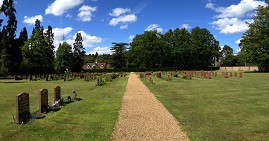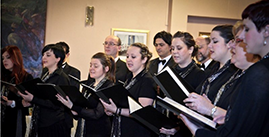Third Annual Commemoration
On Saturday the 4th of March 2017 the third annual commemoration was held in the Serbian Orthodox Church St Sava, in London for courageous women who, in various medical missions, risked and sacrificed their lives in Serbia and on the related fronts during the Great War. The event was organised by St Sava church and the Circle of Serbian Sisters Kosovka Devojka and was supported by Serbian organisations – Serbian Council of Great Britain, Serbian Society, Serbian City Club, Britic and the Embassy of Republic of Serbia.
Father Goran Spaic held the Pomen in English and Serbian, supported by beautiful Zorka Maksimovic's singing. Amongst the dignitaries was Her Royal Higness Princess Katarina.
After the service the commemoration chaired by Olga Stanojlovic, Serbian Council of Great Britain, continued in the Bishop Nikolaj Community Centre. Zvezdana Popovic displayed fifteen panels with photographs and archive documents from her research about women in various foreign medical missions in Serbia during the Great War. Alongside these, there were panels presenting Scottish Women’s Hospital at Royaumont Abbey and Corfu. Most of the panels were exhibited previously on several occasions, and there were a few new ones, particularly regarding Dr Inglis.
Members of the Serbian community together with British guests observed the exhibition and enjoyed delicious canapé prepared by the Serbian Council of Great Britain and the Circle of Serbian Sisters. As this event was during Lent, all the food was completely vegetarian.
Olga Stanojlovic opened the commemoration highlighting the spirit of community and the interwoven ties that hundred years ago profoundly connected British – Scottish and Serbian people.
In her short speech Zvezdana Popovic informed the audience that during the Great War women served in various organisations, such as Serbian Relief Fund hospitals, V.A.D.s , FANYs, Mabel Stobart’s hospital, Scottish Women’s Hospitals, Queen Mary’s Army Auxiliary Corps, St John’s Ambulance Units, British Red Cross, or they came as individuals mostly because they were too late to enrol for a particular medical mission and they desperately wanted to contribute to the war effort.
Regardless from which organisation they came, from which countries and continents, whether they were rich or poor, highly educated or not - they were all in Serbia when Serbia needed their help the most. They were nurses, doctors, orderlies, ambulance drivers, cooks, administrators…
Many of them died from typhus in spring 1915, including Madge Neil Fraser, Louisa Jordan, Augusta Minshull and Bessie Sutherland from Scottish Women's Hospitals, Dr Elizabeth Ross from the First Reserve Military Hospital in Kragujevac, Mabel Dearmer and Lorna Ferris from Stobart Hospital in Kragujevac, and their graves are scattered in Serbia.
The same fate was met by many Serbian women. Ljubica Lukovic died in Nis and Nadezda Petrovic in Valjevo – both founding members of the Circle of Serbian Sisters. One of the first Serbian woman doctors - Draginja Babic - died in Valjevo in February 1915.
Caroline Toughill, from Scottish Women's Hospitals, died during the Great Retreat. Mabel Stobart and all the members of her hospital survived the horrible exodus. In January 2015, during the Serbian Month, we had an opportunity to show the powerful exhibition from the Dorset County Museum – A Dorset Woman at War – about Mabel Stobart’s hospital unit and the Great Retreat.
It would be wrong to remember only those who died in Serbia; only those whose graves are in Kragujevac, Valjevo, Bajina Basta or Nis. What about those who survived the perils of Serbia and died in Greece or France, like Katharine Harley and Mary Burt - both buried at Military Cemetery Zeitinlik, Thessaloniki?
What about those who survived typhus and continued to help Serb soldiers and civilians, like Flora Sandes, Emily Simmonds, Dr Katharine MacPhail and Lady Paget? Lady Leila Paget, Dr Isabel Emslie Hutton and Dr Katharine MacPhail continued to support the Serbs even after the war had ended. Evelina Haverfield set up an orphanage in Bajina Basta and died there in 1920.
We also remember courageous Flora Sandes and Serbian women soldiers - Milunka Savic, Sofija Jovanovic, Vasilija Vukotic and others.
We cannot let these brave women be forgotten. Remembering them we remember and honour not only them, but our own past too.
2017 marks the centenary of death of a truly remarkable woman, Dr Elsie Inglis who was Scottish, British and Serbian heroine. The Embassy of the Republic of Serbia in London commenced the official programme of marking the 180th anniversary of the establishment of diplomatic relations between Serbia and the United Kingdom, with the lecture "Deeds - Not Words. The Story of Elsie Inglis", held in North Kensington Library on 28th of February 2017.
Dr Elsie Inglis was the first woman to receive the Order of the White Eagle, the highest Order in Serbia, in recognition of the work done by her and her units in Serbia. The Crown Prince personally presented this medal to Dr Inglis in April 1916, while Nikola Pasic, the Serbian Prime minister, wrote a letter to the Committee of SWHs:
"Dear Madam, In the name of His Royal Highness The Crown Prince, in the name of the Serbian Government and the whole Serbian nation, I have the honour to convey through you the expressions of our highest gratitude to the noble daughters of the great British nation who have risked their lives and sacrificed their freedom for the health and the good of the Serbian soldier and Serbian people.
I avail myself of this opportunity to tell you how much we appreciate the help rendered to Serbia by the Scottish Women's Association, who sent so many and so splendidly organised hospitals to our country, and who are still continuing to help our people as much as they can.
The Serbian nation will never forget what Scottish women have done for them.”
This letter in the best way summarises the feelings of Serbian people had for Dr Inglis and women from Scottish Women’s Hospitals and other medical missions who were in Serbia when they were needed the most.
Therefore, we were very happy to greet our guest speaker, Alan Cumming, who told us more about Dr Inglis and Scottish Women's Hospitals and showed his documentary film Scottish Women's Hospitals. The audience were captivated by this interesting and poignant story. We were all impressed by Alan's knowledge and passion, particularly when we heard how many times he had visited Serbia. Many of the present Serbs did not know much about Scottish Women's Hospitals and Dr Inglis or have not visited any of the particular historical locations mentioned in the film. Talking about plans for commemoration of the centenary of Dr Inglis' death, we loved the idea of taking Dr Inglis' descendants to Serbia. In September this year Mladenovac will organize this important event in honour of Dr Elsie Inglis. The questions that followed and praises from Princess Katarina and the others showed how fascinated and grateful we all were for the work done by Alan Cumming.
We were delighted to have in the audience young opera singer, Sanja Simic, who sang Tamo daleko for us.
Hundred years ago Dr Inglis, women from the Scottish Women's Hospitals and women in many other medical missions showed to the world what humanity and courage, sacrifice and altruism really meant. Humanitarian work did not end hundred years ago and we concluded the commemoration with an information about two contemporary British charity organizations - Blazing to Serbia and Hospice of Hope - both active in Serbia.
Zvezdana Popovic






